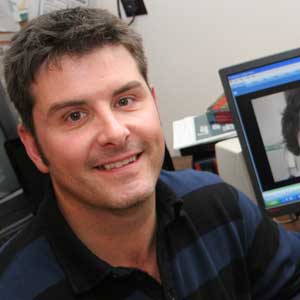 |
| Dr. Steve Porter (Pearce photo) |
Steve Porter has to be one of the most popular professors on campus. His second-year class, Abnormal Psychology, attracts a big crowd, as does "his baby" - the third-year class, Forensic Psychology.
Is it because he's a great teacher? (He gets a happy face for good teaching quality and a chili pepper for hotness on the website Ratemyprofessors.com.) Or because TV legal dramas like Law & Order and detective fiction have made crime - and criminals - so fascinating?
Dr. Porter offers that students are increasingly curious about forensic psychology, the branch of science that brings the application of psychological principles to the criminal justice system. With interest so high, he coordinates the new Honours Program in Psychology with a Certificate in Forensic Psychology at HÂþ»; it's the only undergraduate program of its kind in Canada. As part of their studies, students gain relevant on-the-job training at such sites as Springhill federal prison, Halifax Federal Parole Office and Nova Scotia Forensic Psychiatric Services.
Asked to explain the difference between forensic science and forensic psychology, Dr. Porter doesn't hesitate. "We get them before they're dead," he says dryly.
Two-hundred students are enrolled in his Abnormal Psychology class, but even at that size, students aren't too intimated to offer comments.
"Anyone in class engage in abnormal behavior on the weekend?" asks Dr. Porter as an ice-breaker as students find their spots and flip open laptops or notebooks.
Funny and disarming, the 36-year-old native of Newfoundland is at home in front of his class. During a recent lecture, he talks about schizophrenia, the four subtypes, and on delusional disorder, which is different from schizophrenia. He gives several real-life examples to explain what he means. And, to get "inside the mind of someone with schizophrenia," he flashes up a painting by a British artist who suffers from bouts of paranoid schizophrenia. The unsettling work is full of staring eyes and gnashing teeth. One student cracks that it's not the kind of painting you'd want hanging over your sofa.
Second-year psych major Kayla Hyland says Dr. Porter works hard to get students involved - "We've had some pretty good discussions," she says. He's especially good at peppering his lectures with examples from his own clinical experience, she adds, and making himself available if students want to continue the debate after class.
"I like to encourage as much dialogue as is practical," says Dr. Porter. "Students are not passive receptacles of information and, as professors, we're just not that exciting.
"So I'd say my main goal is to prevent snoring and also to help students develop critical thinking. University should be the place where students can say what they have to say and not be shy about sharing their opinions."
But teaching is just one part of his job. As a licensed forensic psychologist, Dr. Porter also spends time conducting research - his group has just begun a new study on concealed emotions - and in the legal system where is he is called upon for his expertise. He may be asked for his opinion in a dangerous offender hearing, for example, or in police investigations. He also works with judges to help them detect deception and facilitate decision making.
Dr. Porter's research group (which includes graduate students Marcus Juodis and Sabrina Bellhouse, and honours students Leanne ten Brinke and Laura England) is now embarking on research on concealed emotions. The research, which will examine the facial expressions of people when they're disguising their emotions, is supported by a Discovery grant from National Science and Engineering Research Council (NSERC) and an operating grant from the Social Sciences and Humanities Research Council (SSHRC).
"I'm working to generate knowledge (in the lab), share the knowledge through teaching, and apply knowledge in the legal system," he remarks. "It's a job that really encompasses your whole life but I can't think of a better one."
